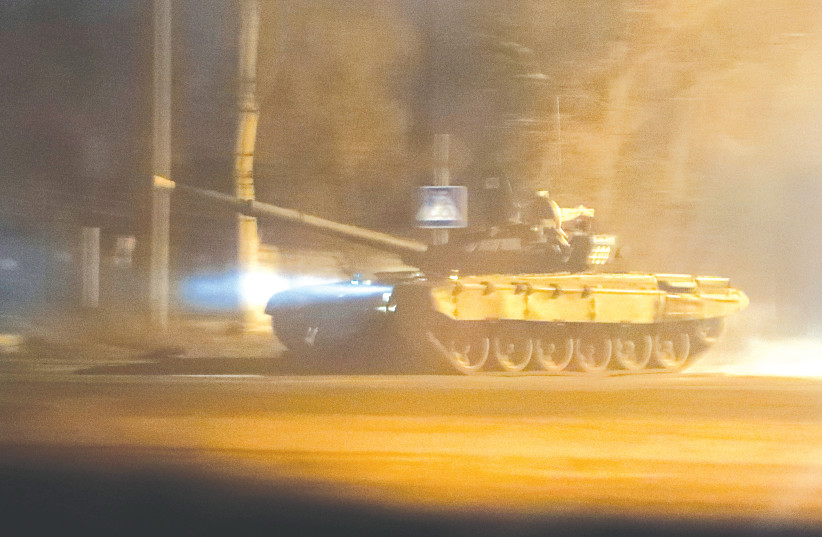US President Joe Biden announced a series of new sanctions against Russia on Tuesday night in response to Russian President Vladimir Putin's recognition of the independence of separatists in Ukraine.
Biden stressed that the new sanctions would be "far beyond" the scale of sanctions issued during the conflict in 2014, adding that more sanctions would be issued if Russia moves forward.
The sanctions include "full-blocking sanctions" against two Russian financial institutions: VEB and Russia's military bank. Comprehensive sanctions will also be placed on Russia's sovereign debt in order to "cut off Russia's government from Western financing."
Starting tomorrow, sanctions will also be placed on Russia's elite and their family members. "They share in the corrupt gains of the Kremlin's policies and should share in the pain as well."
Biden's move to impose a first tranche of sanctions against Russia was a strong "first move," Ukrainian Foreign Minister Dmytro Kuleba said, adding he also got a promise of more weapons from US officials.
"The sanctions that President Biden announced today - they look strong if we consider them as a first move," the Ukraine foreign minister said in an interview with Fox News on Tuesday. He added Ukraine was not seeking US troops on the ground to resolve the crisis.
Biden added that the US was working with Germany to ensure that the Nord Stream 2 pipeline does not move forward.
Biden added that his administration would work to protect American businesses and consumers from rising gas prices and to protect the US economy, but stressed that "defending freedom will have costs for us as well."

"This is the beginning of a Russian invasion of Ukraine," said Biden, warning that the US still believes that Russia is poised to go "much further."
"Who in the Lord's name does Putin think gives him the right to declare new so-called countries on territory that belongs to his neighbors?" asked the president. "This is a flagrant violation of international law and demands a firm response from the international community."
"There is still time to avert the worst-case scenario that will bring untold suffering to millions of people if they move as suggested," stressed Biden, saying that the US and its partners remain open to diplomacy.
The president expressed doubts, though, that Putin was ready for diplomacy, saying that "nothing in Putin's length of remarks indicate any interest in pursuing real dialogue on European security in the year 2022."
A possible meeting between Biden and Putin is "certainly" not an option at the moment, the White House said.
"At this point it certainly is not in the plans," said White House spokesperson Jen Psaki, who added that a de-escalation of conflict with Ukraine would be needed for such a summit.
Biden added that US forces and equipment already stationed in Europe were being moved into Estonia, Latvia and Lithuania in response to Russia's refusal to remove troops from Belarus, stressing that this was a "totally defensive" move and that the US has no intention to fight with Russia.
"We want to send an unmistakable message, though, that the US, together with our allies, will defend every inch of NATO territory and abide by the commitments we made to NATO," said Biden.
Canadian Prime Minister Justin Trudeau on Tuesday also announced a first round of economic sanctions on Russia.
Japan is imposing sanctions on Russia over its actions in Ukraine, including prohibiting the issuance of Russian bonds in Japan and freezing the assets of certain Russian individuals, Prime Minister Fumio Kishida said on Wednesday.
Also on Wednesday, Australian Prime Minister Scott Morrison said to expect subsequent tranches of sanction. "This is only the start of this process," Morrison said.
The sanctions issued by the US, Canada, Australia and Japan join sanctions issued by the UK and European Union on Tuesday.
The EU agreed to sanction 27 Russians and entities, including all members of the lower house of Russia's parliament.
The UK slapped sanctions on Gennady Timchenko and two other billionaires with close links to Putin, as well as five banks - Rossiya, IS Bank, GenBank, Promsvyazbank and the Black Sea Bank.
Reuters contributed to this report.
